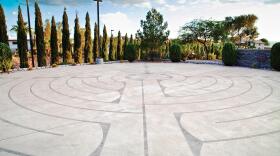A new book follows people attempting to escape life in LV’s storm drains
Underground is typically a term you use to romanticize your estrangement from the mainstream, but for some people — as author Matt O’Brien showed us in his 2007 book Beneath the Neon — it’s a tragically literal description of a life almost wholly estranged from society. Subtitled Life and Death in the Tunnels of Las Vegas, O’Brien’s book introduced readers to the homeless people who live down in the storm-drain system undergirding vast tracts of the city. It was a bracing reminder that a city’s prosperity is no bulwark against the personal and social ills that create an underclass the rest of us don’t see (or want to).
Thirteen years later, O’Brien is back with a follow-up, and as its title makes clear, Dark Days, Bright Nights: Surviving the Las Vegas Storm Drains (Central Recovery Press, $18.95), this book has a new mission: to highlight former tunnel-dwellers who have reemerged into society, often with great difficulty and against lopsided odds. (In that time he also founded Shine a Light, a nonprofit dedicated to helping them.)
In a sense, this book is a corrective. As O’Brien points out in his introduction, the grim spectacle of social castoffs living in the neon-tinged twilight below Sin City proved irresistible to national and international media, particularly against the backdrop of the Great Recession. The author himself led many journalists into the tunnels. Those resulting notes from underground tended to play up the gritty drama and danger of the situation — with little attention paid to successful escapees. Dark Days, Bright Nights tells some of their stories.
Using the oral-history format (and employing his subjects’ street names), O’Brien arranges their narratives into the very human up-and-down rhythms of lives decentered by addictions, mental illness, and poverty. There are compelling glimpses of rock-bottom (“He showed me his little spot, broke out some crack, and I smoked with them,” Tommy says. “That’s how I ended up down there”), and from every stage of getting clean, finding hope, relapsing, trying again. “The first two or three nights back we cried ourselves to sleep,” Pretty Boy Steve confesses. “We couldn’t believe we were down there again.” (“I do see better things ahead,” he says later.)
If not every outcome is conventionally inspiring — “I’ll probably be dead,” Zero says toward the book’s end. “Live fast, die hard, and leave a decent-looking corpse” — you can’t help but pull for a survivor like Cyndi. “I’d like to open a treatment center in Vegas and help people in the tunnels,” she tells O’Brien. “That’s my ultimate dream.” Or David, who says, “My focus is being the best grandfather I can be,” and whose fondest hope is to escort his granddaughter on her first date seven or eight years from now. Such a very above-ground thing to want.










